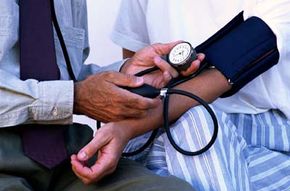Atherosclerosis, or the narrowing of blood vessels, is an equal opportunity disorder. While atherosclerosis in the coronary arteries leads to the number one cause of death in Western civilization, blood vessels throughout the rest of the body can get clogged, too. The problem, known as peripheral artery disease, or PAD, afflicts up to 12 million Americans, though only about half develop symptoms.
PAD can occur in the arms and other parts of the body but most often strikes below the belt. As blood flow to leg muscles slows down, pain and cramping can result in the calves, thighs, or hips while walking. The discomfort fades if you stop to rest. Because the pain comes and goes, it's known as intermittent claudication.
Many people who develop PAD symptoms never mention them to doctors, figuring a little pain now and then is part of aging. But over time, lack of adequate blood flow to the lower limbs can lead to some serious consequences. Poor circulation to the lower extremities can lead to nasty sores, gangrene, and even an amputated foot or two.
Here's why you should really care: People with diabetes are two to three times more likely than people who don't have the disease to develop PAD. In fact, as a diabetes patient, once you reach age 50, your odds are about one in three. Furthermore, when compared to other patients with PAD, people with diabetes are 10 to 30 times more likely to have a foot amputated.
And believe it or not, that isn't the scariest part. Doctors have come to think of PAD as a red flag -- a warning that a patient is a heart attack or stroke waiting to happen. One study found that 70 percent of people who have PAD also have severe blockages in their coronary arteries. Another determined that intermittent claudication shortens lifespan by about 10 years.
There is much more to the PAD story, but because it is exacerbated by nerve damage -- and because foot problems are a major part of managing diabetes.
Diabetes can affect a diabetic's heart health in several ways. Keeping your heart as healthy as possible -- while controlling your blood sugar -- is essential. Talk with your doctor about your potential risks.
For more information on diabetes and its effect on the heart, try the following links:
- Diabetes and Heart Disease explains the relationship between these two conditions.
- Diabetes Symptoms covers the diverse signs of the disease, from increased thirst and hunger to sudden weight loss.
- To learn more about diabetes in general, including diagnosis, causes, symptoms, and treatment, visit our main Diabetes page.
- For more information about heart disease in general, read How Heart Disease Works.
- Discover practical tips for preventing heart disease at Home Remedies for Heart Disease.
Timothy Gower is a freelance writer and the author of several books. His work has appeared in many magazines and newspapers, including Prevention, Health, Reader's Digest, Better Homes and Gardens, Men's Health, Esquire, Fortune, The New York Times, and The Los Angeles Times.
ABOUT THE CONSULTANTS
Dana Armstrong, R.D., C.D.E., received her degree in nutrition and dietetics from the University of California, Davis, and completed her dietetic internship at the University of Nebraska Medical Center in Omaha. She has developed educational programs that have benefited more than 5,000 patients with diabetes. She specializes in and speaks nationally on approaches to disease treatment, specifically diabetes.
Allen Bennett King, M.D., F.A.C.P., F.A.C.E., C.D.E. is the author of more than 50 papers in medical science and speaks nationally on new advances in diabetes. He is an associate clinical professor at the University of California Natividad Medical Center and cofounder and medical director of the Diabetes Care Center in Salinas, California.
This information is solely for informational purposes. IT IS NOT INTENDED TO PROVIDE MEDICAL ADVICE. Neither the Editors of Consumer Guide (R), Publications International, Ltd., the author nor publisher take responsibility for any possible consequences from any treatment, procedure, exercise, dietary modification, action or application of medication which results from reading or following the information contained in this information. The publication of this information does not constitute the practice of medicine, and this information does not replace the advice of your physician or other health care provider. Before undertaking any course of treatment, the reader must seek the advice of their physician or other health care provider.
